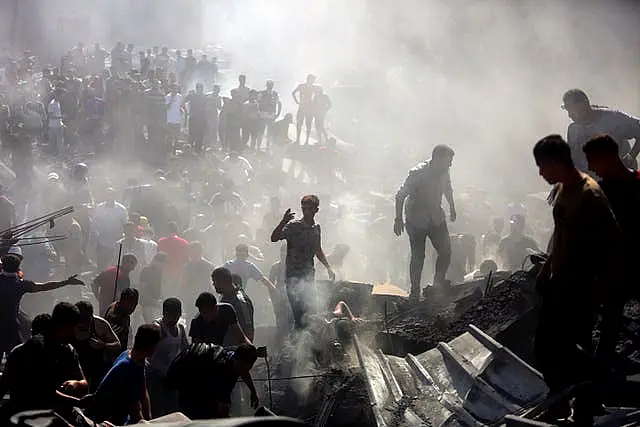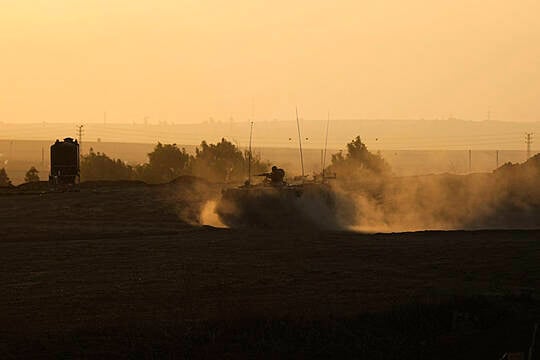Israeli troops and tanks launched an hours-long ground raid into northern Gaza overnight into Thursday, the military said, striking several militant targets in order to “prepare the battlefield” ahead of a widely expected ground invasion after more than two weeks of devastating air raids.
The raid came after the UN warned it is on the verge of running out of fuel in the Gaza Strip, forcing it to sharply curtail relief efforts in the territory, which has also been under a complete siege since Hamas’s bloody rampage across southern Israel ignited the conflict earlier this month.
Deputy Hamas chief Saleh al-Arouri said that “despite the enemy’s crimes … the resistance is well”, referring to the group’s military wing and allies.
The statement on Thursday came after intense overnight Israeli strikes in the besieged Gaza Strip ahead of the expected ground invasion.

“It (Hamas and militant groups) will turn your tragedies into joy, in the event of a ground invasion” the Beirut-based top Hamas official said in a statement addressed to Palestinians in Gaza shared by the Palestinian group’s media office in Beirut.
Mr Al-Arouri met the leader of Lebanon’s Hezbollah group, Hassan Nasrallah, and the head of Palestinian Islamic Jihad, Ziad al-Nakhleh on Wednesday. The leaders reached an agreement on next steps in the current “sensitive” situation, according to a statement shared by Hezbollah.
Benny Gantz, a retired general and a member of Israel’s war Cabinet, said that any possible ground offensive would be only “one stage in a long-term process that includes security, political and social aspects that will take years”.
“The campaign will soon ramp up with greater force,” he added.
The rising death tolls in Gaza are unprecedented in the decades-long Israeli-Palestinian conflict. Even greater loss of life could come if Israel launches an expected ground offensive aimed at crushing Hamas, which has ruled Gaza since 2007 and survived four previous wars with Israel.
The Health Ministry in Hamas-ruled Gaza said Wednesday that more than 750 people were killed over the past 24 hours, higher than the 704 killed the previous day.
The Associated Press could not independently verify the death toll, and the ministry does not distinguish between civilians and combatants.
By comparison, 2,251 Palestinians, mostly civilians, were killed in the entire six-week-long war in 2014, according to UN figures.

Iran’s foreign minister said Hamas is ready to release civilian prisoners abducted from Israel but that the international community must take responsibility for releasing 6,000 Palestinian prisoners held in Israel.
Hossein Amirabdollahian told an emergency meeting of the UN General Assembly on Thursday that Iran “stands ready to play its part in this very important humanitarian endeavour, along with Qatar and Turkey”.
Iran is a key backer of Hamas, and Qatar has already played a key role in the release of four Israeli civilians, among the more than 200 still held captive.
Mr Amirabdollahian accused the United States of directly participating in the Israeli-Hamas war and what he called a “genocide” against the Palestinians.
He also issued a strong warning “against the uncontrollable consequences of the unlimited financial, arms and operational support by the White House to the Tel Aviv regime”.
“I say frankly to the American statesman, who are now managing the genocide in Palestine, that we do not welcome to expansion of the war in the region,” Iran’s top diplomat said in English at the start of his remarks.
The Israeli military says it strikes only militant targets and accuses Hamas of operating among civilians in densely populated Gaza. Palestinian militants have fired rocket barrages into Israel since the war began.
During the overnight raid, the military said soldiers struck fighters, militant infrastructure and anti-tank missile launching positions. There were no immediate reports of casualties on either aide.
Meanwhile, an airstrike hit a residential building in the southern town of Khan Younis early Thursday.
Ambulances streamed into the nearby Nasser Hospital, but there was no official word on casualties. Family members said the building had housed 75 people, including 25 displaced relatives.
Israel said it had carried out around 250 airstrikes across Gaza in the last 24 hours, targeting tunnel shafts, rocket launchers and other militant infrastructure.
The Gaza Health Ministry says more than 7,000 Palestinians have been killed in the war. That figure includes the disputed toll from an explosion at a hospital last week.
The fighting has killed more than 1,400 people in Israel, mostly civilians slain during the initial Hamas attack, according to the Israeli government. Hamas also holds some 222 hostages in Gaza.
The warning by the UN agency for Palestinian refugees, UNRWA, over depleting fuel supplies raised alarm that the humanitarian crisis could quickly worsen.
Gaza’s population has also been running out of food, water and medicine. About 1.4 million of Gaza’s 2.3 million residents have fled their homes, with nearly half of them crowded into UN shelters. Hundreds of thousands remain in northern Gaza, despite Israel ordering them to evacuate to the south, saying those who remain might be considered “accomplices” of Hamas.

In recent days, Israel let more than 60 trucks with aid enter from Egypt, which aid workers say is insufficient and only a tiny fraction of what was being brought in before the war. Israel is still barring deliveries of fuel — needed to power generators — saying it believes Hamas will take it.
An official with the International Committee of the Red Cross said it hopes to bring in nearly a half dozen trucks filled with vital medical supplies.
“This is a small amount of what is required, a drop in the ocean if you will, given the severity of the consequences of the violence in the last two and a half weeks,” said William Schomburg, head of the sub-delegation in Gaza.
“Today, we are looking at eight to 10 trucks coming in. We have more that are lined up,” he said. “We are trying to establish a pipeline.”
UNRWA has been sharing its own fuel supplies so that trucks can distribute aid, bakeries can feed people in shelters, water can be desalinated, and hospitals can keep incubators, life support machines and other vital equipment working.
If it continues doing all of that, fuel will run out by Thursday, so the agency is deciding how to ration its supply, UNRWA spokeswoman Tamara Alrifai told The Associated Press.
“Do we give for the incubators or the bakeries?” she said. “It is an excruciating decision.”
More than half of Gaza’s primary health care facilities and roughly a third of its hospitals have stopped functioning, the World Health Organisation said.

The conflict has also threatened to spread across the region. The Israeli military said Wednesday it struck military sites in Syria in response to rocket launches from the country. Syrian state media said eight soldiers were killed and seven wounded.
Strikes in Syria also hit the airports of Aleppo and Damascus, in an apparent attempt to prevent arms shipments from Iran to militant groups, including Lebanon’s Hezbollah. Israel has been exchanging near daily fire with Iranian-backed Hezbollah across the Lebanese border.
Lebanese state media said Israel conducted airstrikes and drone attacks early on Thursday in southern Lebanon, near the tense Israel-Lebanon border.
No casualties were reported but the strikes ignited fires in the fields near in the border town of Aita al Shaab, the National News Agency (NNA) reported.
On Wednesday night, Israeli strikes hit the Tyre district and a mattress factory there, NNA said, while small-arms fire was exchanged between militants and Israeli troops along the border.
Hamas’s surprise rampage on October 7 in southern Israel stunned the country with its brutality, its unprecedented toll and the failure of intelligence agencies to know it was coming.
Prime Minister Benjamin Netanyahu said in a speech on Wednesday night that he will be held accountable, but only after Hamas was defeated.
“We will get to the bottom of what happened,” he said. “This debacle will be investigated. Everyone will have to give answers, including me.”
On Wednesday, the wife, son, daughter and grandson of Wael Dahdouh, a veteran Al-Jazeera correspondent in Gaza, were killed in an Israeli strike.
Mr Dahdouh and other mourners attended the funerals on Thursday wearing the blue flak jackets used by reporters in the Palestinian territories.
Later on Thursday Hungary’s foreign ministry said two Israeli-Hungarian children are among the more than 200 hostages held by Hamas in the Gaza Strip.
The children, both dual Hungarian citizens, are 15 and eight years old, and were reportedly taken from the home of their father in a kibbutz near the border with Gaza during Hamas’s raid in southern Israel.
The ministry had previously said that 15 Hungarian citizens were in Gaza, but had not reported that any were there as hostages.







